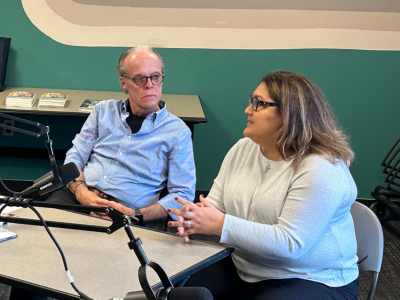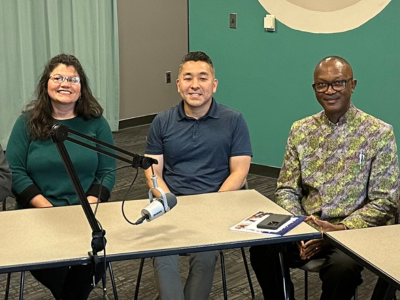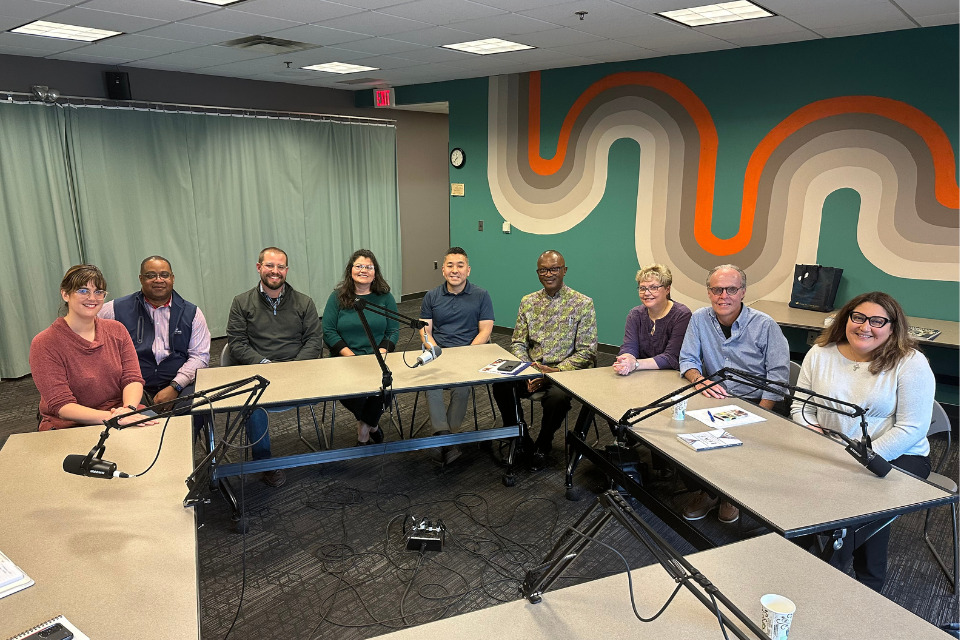What is the future of The United Methodist Church in Michigan? A recent conversation with a group of young clergy reveals honesty and hope.
JOHN E. HARNISH
Michigan Conference Communications
Editor’s note: This is one of several articles that will explore the future of The United Methodist Church in Michigan.
“I feel hopeful about the future of the church, but I think it is going to get worse before it gets better.”
Rev. Zack Dunlap’s comment was the first in a clergy conversation about the church’s future, held at Birmingham: First United Methodist Church on October 27, 2023. Rev. John E. Harnish invited a small group of primarily younger clergy from the Detroit area to get together after the fall meeting of the United Methodist Union of Greater Detroit, where he spoke on “Reclaim, Revive, Renew: The Future of The United Methodist Church.” (Click here to watch.)
The address invited participants to look beyond the current wave of disaffiliation and the upheaval brought about by the formation of the Global Methodist Church. With the majority of churches in Michigan choosing to remain United Methodist, it’s time to focus on what we need to do to move the church forward.
The clergy conversation included Caucasian, African American, Pan-Asian, Hispanic, and women clergy, as well as a clergy couple and an ordained deacon.
Zack continued, “I don’t think that’s a bad thing because I am looking 20, 30, 40 years down the road. It’s going to be messy, but in some ways, we will emerge in a healthier place.” Immediately following his comment, Deacon Laura Sperian added a word of urgency: “I feel like if things don’t start getting better pretty quickly, people are going to lose heart. People have been waiting for so long.”

Their comments reflected the mix of feelings in a group of younger clergy who will be leading the church into that future with whatever it holds, committed to serving amid the challenges and opportunities ahead. Despite the current wave of disaffiliations and the long struggle over LGBTQIA+ and racial inclusion in the church, these clergy are facing the future with hope.
One of the common themes was the call to focus on our primary mission: “Making disciples of Jesus Christ for the transformation of the world.” But as Rev. Elizabeth Hurd said, “Sometimes we mistake our methods for our mission. Today, our methods are being shaken. We have to be willing to change our methods and polity if we are going to be true to our mission and reach the world.” One of the youngest clergy in the room, Elizabeth pressed the group to think about what it means to relate to Gen Z and the generation after them. She said, “As a young clergyperson, I have one foot in the church as it has been and one foot in the church that is going to be. Going into the future, we need to root ourselves in Jesus and tell the story of Jesus in ways that make sense to a new generation who simply doesn’t know the story.”
Reflecting on the generational divide in the church, Rev. Rachael Dunlap shared about her congregation, many of whom are aging and unable to do things the way they used to. “They are still holding on to those hopes, those dreams of what was,” she said, “but right now, I am also seeing some 80-plus-year-olds who are stirring with some excitement as they begin to feel the Holy Spirit move in new ways.”
Still focusing on the church’s mission, Rev. Charles Boayue, a native of Liberia, brought a global perspective. Since much of our infighting has been within the American church, he asked, “Are we going to be a global church still, or a church solely committed to the primary reason for this schism, that is, LGBT rights and inclusion? If that is the main thing that shapes us, we will miss the mark because God’s reach is to the whole world. If the American church continues to navel-gaze, we may lose sight of our global connection.”

The group was gathered under the long shadow of the debate over LGBTQIA+ issues, which has brought about the disaffiliation of some churches in Michigan. Looking to the future, Rev. April Gutierrez, a Hispanic clergywoman, emphasized the importance of inclusion as central to the Gospel. “Jesus always brought the Gospel to those on the outside. So that’s why inclusion is not a political issue; it is central to our mission and essential to who we are called to be.”
As the superintendent of the Greater Detroit District, Rev. Darryl Totty oversees a broad cross section of churches, including urban and rural, inner city and suburban, small town and city congregations in southeast Michigan. He challenged the group: “Celebrate who we are. Tell our story and promote mission engagement, justice, and peace. We are all neighbors, and we should be neighbors around the world.” He referred to his pickleball partners, which include Jewish and Palestinian players. “They remind me that, in spite of what we see in the world today,” he said, “we can learn to live with one another in peace. I think the church can help do that. I’m a believer!”
Rev. Paul Hahm introduced the word “generative” to the conversation, a word that comes from writer Richard Rohr. Paul said, “It means that from leadership and throughout the community, people need to experience an atmosphere where they are uplifted, hopeful, and healed, a community which transcends our ideological and theological differences. That kind of community has the potential to make a big difference in the world.”
In his comments, Rev. Kevin Smalls seemed to sum up the conversation: “There are always emerging signs of hope even amid atrophy and decline. Younger people are still responding, congregations are still hungry to take bold steps and dream again, and the Spirit is still stirring within and among us. This is the time for a new vision for The United Methodist Church.”
The group agreed that renewal in The United Methodist Church will not come overnight, and we are not going to “fix it” with one General Conference or perhaps even in our lifetime. Instead of saying we will solve all the world’s social ills immediately, they believe we need to tell others, “Will you come and help us do the work, one step at a time? Would you help us make the world just slightly better than it is right now?” They agreed that in that spirit, there is indeed hope for the future, one step at a time. And under the leadership of a new generation of vibrant, creative, committed clergy, there is hope for The United Methodist Church in Michigan.
Last Updated on November 21, 2023

